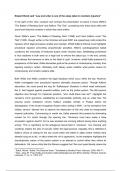Edward Bond said “Law and order is one of the steps taken to maintain injustice”
In the light of this view, compare and contrast the presentation of justice in Oscar Wilde’s
'The Ballad of Reading Gaol' and Kafka’s 'The Trial', considering how these texts reflect the
social and historical contexts in which they were written.
Oscar Wilde’s poem “The Ballad of Reading Gaol” (1898) and Franz Kafka’s novel “The
Trial” (1925), though written in the Victorian and post-WW1 era respectively, both protest the
injustice which legal processes enable and maintain. Whilst Kafka’s fictional novel highlights
procedural injustice preventing proportionate penalties, Wilde’s autobiographical ballad
condemns the immorality of retributive justice under Victorian laws. Debilitating punishment
is thus explored in both texts as a legal tool to enforce the status quo. In the end, society
must always find someone to take on the label of ‘guilt’. However, whilst Kafka presents K’s
acceptance of this label, Wilde dismantles guilt as the product of contemporary morality, thus
rejecting society’s verdict. Ultimately, both literary works redefine what justice means for
contemporary and modern readers alike.
Both Wilde and Kafka condemn the legal injustices which occur within the law. However,
Kafka investigates how procedural injustice ultimately obscures justice. Through Kafka's
absurdism, the novel paved the way for ‘Kafkaesque’ literature in which weak individuals,
like K, feel trapped against powerful entities, such as the justice system. The third person
objective lens through K’s rhetorical question, “who could these men be?”, highlights the
narrator’s ironic ignorance, establishing an inaccessible authority and an unfair trial. The
ensuing power imbalance mirrors Kafka’s unstable climate in Prague before the
disintegration of the Austro Hungarian Empire when writing in WW1,1 as his exemption from
military service2 allowed him to observe the destruction of law and order by irresponsible
imperial authorities. Commencing in media res, Kafka presents this paradox by eliminating
context for K’s arrest through the opening line, “Someone must have made a false
accusation against Josef K, for he was arrested one morning without having done anything
wrong.” This is significant as the ambiguous lexical field in ‘someone’, ‘one morning’ and
‘anything’ implies the lack of security within the legal process. Arguably, this is reflected in
Kafka’s choice of setting for the law courts which are hidden in alleys where ‘clothes were
already hung out to dry,’ or attics where the ‘air is oppressive,’ as the metaphor highlights the
claustrophobic nature of the justice system in an attempt to control rather than reform its
defendants. Yet, some critics like Eric Marson suggest that “the court quite literally cleans the
1
Stach, Reiner. “Kafka: The Decisive Years.” Translated by Shelley Frisch. Harcourt, 2005: 465–71
2
Herz, Julius M. “Franz Kafka and Austria: National Background and Ethnic Identity.” Modern Austrian
Literature 11, no. ¾, 1978: 310




